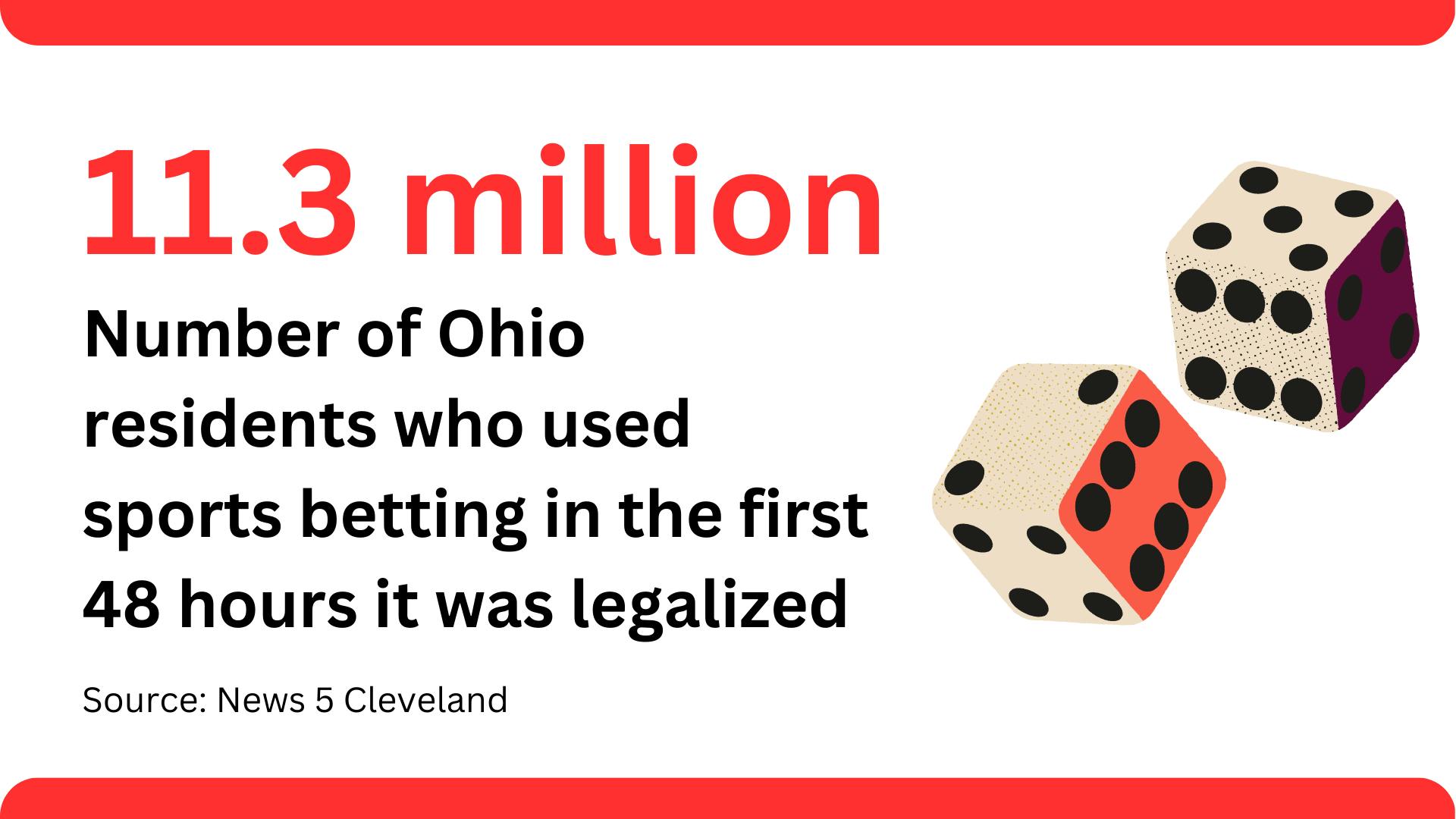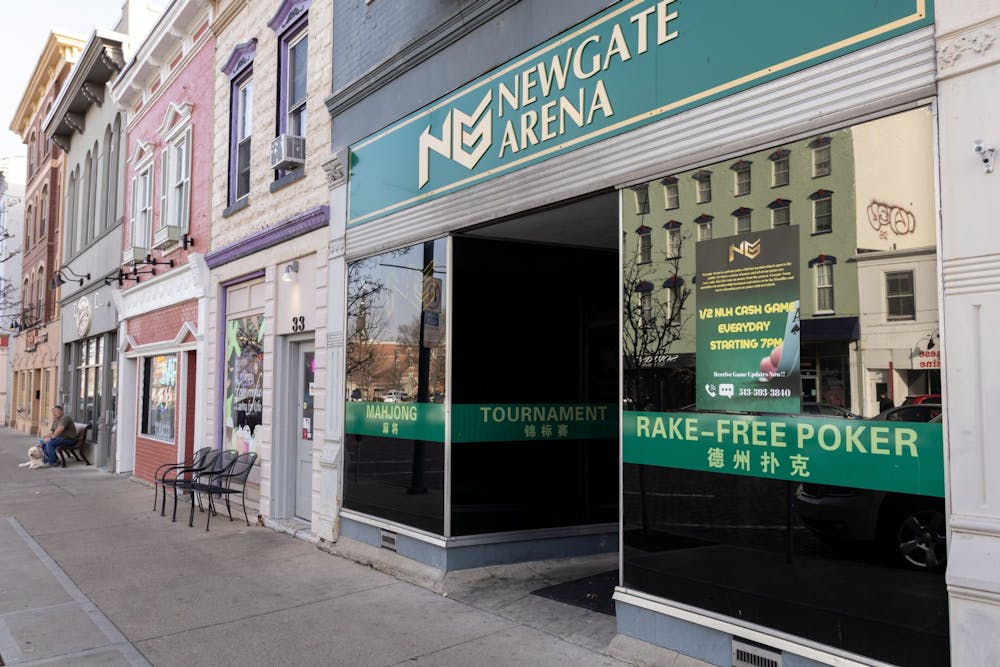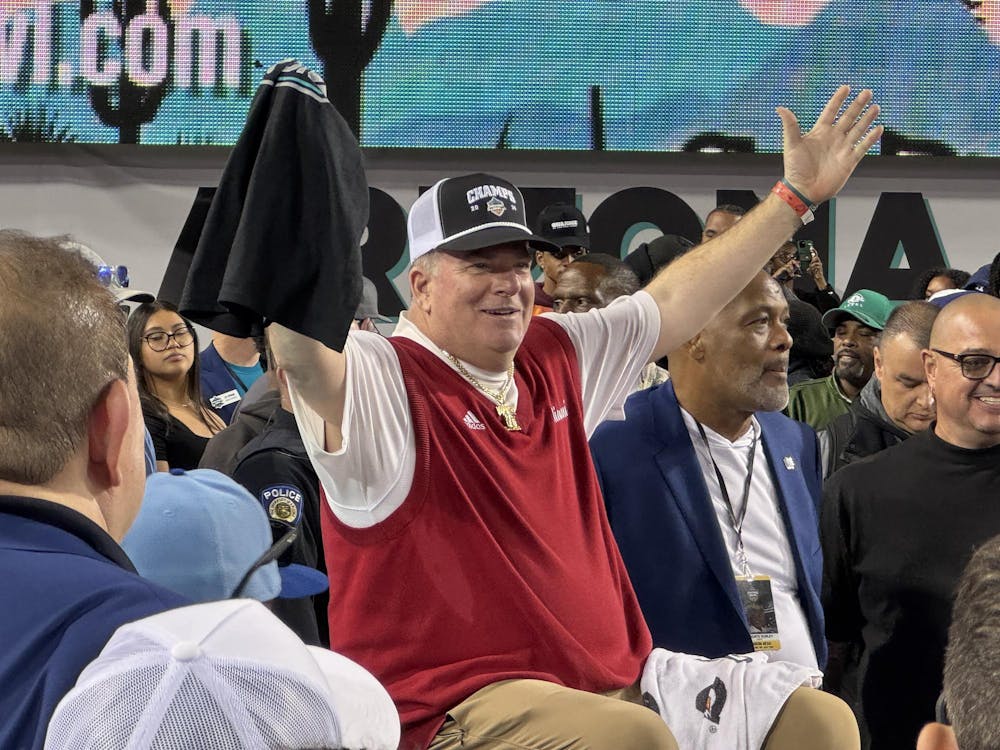At this point, most people have seen the Ohio sports betting ads. They’re everywhere.
Advertisements have flooded social media pages and television commercials, hoping their bright colors and Kevin Hart will attract new bettors.
Apps like FanDuel and DraftKings are even offering “free money” to wager, a low-stakes entry with the apparent promise of winning big. DraftKings gives a “free” $200 with a $5 deposit. FanDuel offers a bonus bet guarantee with a $10 stake.

For one anonymous senior biology major, the marketing has worked.
“The only reason that I do it is because I got the $200 in free play,” the senior said. “The second I lose it, I'm not playing again because the house always wins.”
The biology major is up $225 on DraftKings, all from the “free money,” and he’s not in this hobby alone. His house is home to four bettors, and they’re not the only ones he knows.
“We all do it just because we got free money and I feel like it's a pretty commonplace activity,” the senior said. “Most guys that I know are involved in some way, shape or form.”
A tale as old as time
Sports betting has been around campus before it was consuming every ad slot. One anonymous junior sports communication and media major said all it takes to get in on underground betting is an entry fee.
“Basically, you just need to know someone or have a friend that knows someone that has a server or site,” the junior said. “Obviously, it’s not ideal. Sometimes there’s situations where you could be on a bad book where you don't get to put your money in or don’t get your money back quickly.”
Enjoy what you're reading?
Signup for our newsletter
The 20-year-old junior started sports betting three years ago while in high school. But he’s not the longest-tenured bettor he knows.
“I know a guy that’s been gambling since he was 13,” he said, “which is just ridiculous, obviously.”
This long-term betting does not come without its worrying points. According to the Mayo Clinic, “gambling can stimulate the brain's reward system much like drugs or alcohol can, leading to addiction.”
Addiction can sneak up on bettors without warning. The simple joy of cashing a bet can become something they yearn for. The serotonin release that comes from successfully hitting a bet, big or small, is the hook connected to the habit.
“That's the problem with gambling,” the junior said. “We get addicted to the feeling of that kind of a win, and you just bet on table tennis or esports or anything because you just want to try to have a win.”
This bettor combats addiction by taking breaks that last weeks or months at a time. Having this self-control has allowed him to continue betting. But he doesn’t recommend sports betting to anyone looking to pick it up.
“Don’t,” he said. “That’s what I tell people. Only 1% truly win.”
The data behind sports betting
The idea of sitting down to watch a game you have money on is invigorating to some, but casinos and bookmakers ultimately control the numbers with revenue in mind.
The first return comes from the vigorish or vig. This is the fee that betting companies take off the top from every wager placed for using their platform. The vig varies from bet to bet because of the odds put in place.
With this vig, a bettor has to win more than 50% of their bets to truly break even.
Robert Davis, an associate professor in the statistics department and a member of the Institute for Responsible Gaming, Lotteries, and Sport, understands the vig and how bettors have to overcome it.
“Basically, you've got to be able to bet at a 55% win rate to make up for the point that they scoop off the top as soon as you make the bet,” Davis said. “Of the dollar that you bet, 90 cents could be being bet and the other 10 cents is going to the bookmaker.”
Betting isn’t a straightforward number game because bookmakers give themselves space for their gain.
The spread, or set amount a team is predicted to win by for a given game, is not guaranteed, it is the most likely outcome. The spread is set to try to split voters down the middle. If this plan prevails, the bookmaker will get the money from the losing side, along with the vig from the winners.
“If they can get 50/50 on each side of the line, then the losers are going to pay off the winners plus they're going to skim their part off the top, and that's why the spreads will move,” Davis said.
Moving the spread allows bookmakers to see where the middle of the betting public is. The spread can change anytime before the game in question. This allows people to change their minds or bet when they didn’t want to before.
“That's why you'll see Cincinnati is favored by seven, but then too much money comes in on the underdog,” Davis said. “And then I'll move the points down to six.”
A different kind of betting
The Newgate Arena Poker Club is the home of self-determination betting in Oxford. The business is classified as a poker club, which differs from a casino by excluding the “house” from playing. This makes the games fully player-decided.
One anonymous sophomore digital commerce major said the club has a full table every night.
“There’s easily 10 people a night, which is a full table,” the sophomore said. “It’s pretty much all regulars. I’d say 75% Miami students and 25% locals.”
The digital commerce major sees poker as more than just a game. Newgate allows him to enjoy the pastime around a table while gaining something for himself, he said.
“I've made more money playing poker than I've made doing anything else ever in my life,” the sophomore said. “If you always play a certain way, then you will generally be profitable.”
The specific playing style that he is talking about is related to game theory optimal (GTO). GTO is a specific strategic playing style that focuses on the expected outcome of games and options related to risk. GTO does not take the psychological factor of poker into account.
This style is not counting cards. It is simply when to and when not to play your cards or bet higher.
“The problem most players have is just discipline,” the sophomore said. “Really you control every single dollar that you can win or lose.”




